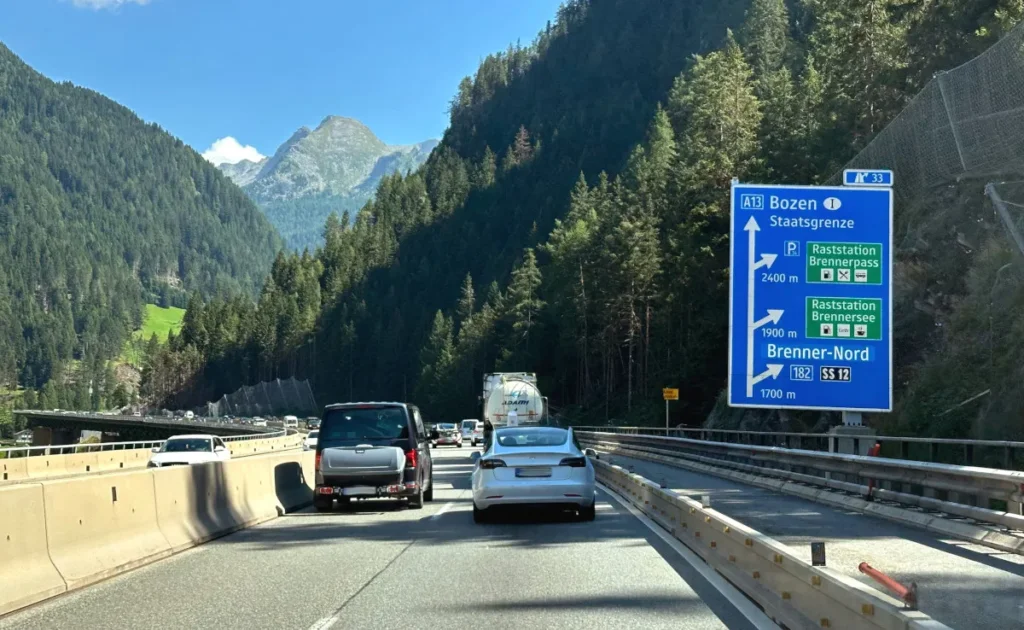Efforts to introduce a digital slot booking system for heavy goods vehicles on the Brenner route have gained fresh momentum following recent high-level political meetings. Austria, Bavaria and Italy have reaffirmed their intention to develop a coordinated solution aimed at easing congestion and resolving long-standing tensions over freight transit on this vital north-south corridor through the Alps.
On 10 July 2025, Austrian Chancellor Christian Stocker and Bavarian Prime Minister Markus Söder announced plans to revive a digital slot system for trucks, originally proposed in 2023. As reported by the German Press Agency (dpa), the system would require freight operators to book specific time slots before crossing the Brenner Pass, one of Europe’s busiest transit routes for goods transport.
Chancellor Stocker stated he was committed to reaching an agreement with all stakeholders and planned to discuss the matter with Italian Prime Minister Giorgia Meloni. Söder stressed that Italian participation would be key:
“If the Italians agree to this, then that would truly be the solution,” he said.
The proposed system is intended to reduce the impact of Tyrol’s current block clearance measures, which restrict the number of trucks permitted to enter Austria from Germany on certain days. These restrictions, intended to protect Tyrol’s environment and infrastructure, have caused frequent and lengthy queues on the German side, particularly along the Inntal Autobahn.
Meloni calls proposal “pragmatic”, technical group to assess feasibility
According to a report by Transporto Europa on 15 July 2025, Chancellor Stocker and Prime Minister Meloni discussed the slot system during a bilateral meeting in Vienna. Meloni described the idea as a “pragmatic solution”, but said further evaluation was needed. A technical working group involving the transport ministries of Italy, Austria and Germany is expected to be set up to assess the legal and IT feasibility of the model.
Italy, however, has not formally committed to the system and continues its legal action against Austria at the European Court of Justice (ECJ), challenging the legality of the current restrictions on freight transit.
The slot system, as envisaged in 2023 by Bavaria, Tyrol and South Tyrol under a joint declaration, would allow a maximum of 300 trucks per hour to transit the Kufstein, Vipiteno section. Vehicles would need to reserve a 30-minute slot at least 24 hours in advance, with priority given to intermodal freight and Euro VI trucks.
According to Transporto Europa, Austria’s road authority Asfinag has already developed prototype software and a control centre in Innsbruck and is prepared to launch a voluntary pilot trial on the Verona, Munich corridor.
In case you missed it: Drivers offered container sleep pods at logistics centre
German government voices cautious support
German Chancellor Friedrich Merz has also expressed openness to the slot system. During a visit to Bavaria, Merz acknowledged the challenges at the Brenner crossing and said a trilateral solution involving Italy would be acceptable. However, he emphasised that infrastructure improvements were the long-term goal:
“The traffic routes over the Alps must be developed in such a way that a slot system is no longer necessary,” VerkehrsRundschau reported this week.
Merz also made clear that any system must not impose additional costs on hauliers, a concern echoed by German freight associations.
Further reading: Hauliers warned: Netherlands plans roadside AdBlue checks
Diverging views from stakeholders
The proposed slot system has received mixed responses. According to Transporto Europa, Austria, Bavaria and the Tyrolean regional government support the idea, provided Italy signs on. However, Tyrol has called for a strict annual cap of two million heavy vehicle transits.
Italian road haulage associations are firmly opposed, viewing the slot system as a disguised quota that undermines the free movement of goods. Conversely, the Austrian citizens’ group Transitforum Tirol also opposes the plan, but on the grounds that it could lead to higher volumes of truck traffic if implemented without firm limits.
ECJ decision still pending
While politicians on all sides have underlined the importance of a political agreement, Bavaria continues to push for EU-level involvement. Söder told dpa that the European Commission should take a clear stance, adding that he believed block clearance “clearly contradicts EU law”. A decision from the ECJ is expected, although no date has been set.
A trilateral technical meeting between Italy, Austria and Germany is scheduled for September 2025, with a political decision possibly following at the EU Transport Council in December. In the meantime, the situation on the Brenner corridor remains unresolved, caught between national interests, environmental concerns, and the European principles of free movement.









